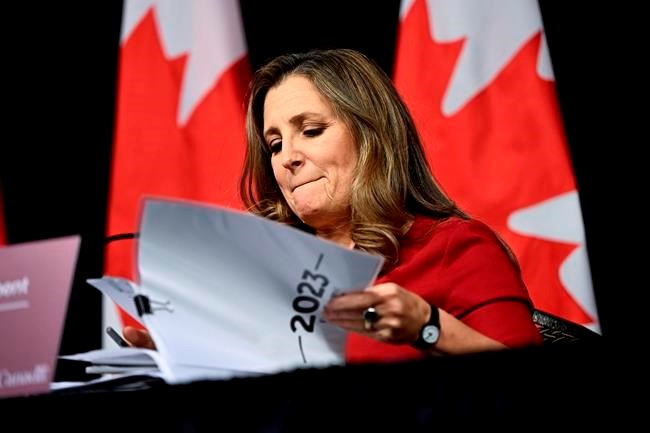OTTAWA — The Liberal government's fall economic statement acknowledges the cost-of-living crisis weighing on Canadians but offers few new measures to tackle it, while pledging to keep deficits in check.
Finance Minister Chrystia Freeland presented her fiscal update in the House of Commons on Tuesday, stressing the pressure that inflation and a slowing economy are putting on federal finances.
At a time when the Liberals are facing pointed criticism from the Opposition Conservatives for years of deficit spending, the update outlines new guardrails to demonstrate fiscal restraint.
That includes setting a goal to keep deficits below one per cent of gross domestic product beginning in 2026-27.Based on the federal government's projection for the size of the economy in 2026, that would mean the deficit would have to be capped at about $32 billion.
The Liberals are also aiming to maintain the current fiscal year's deficit at or below the spring budget projection of $40.1 billion, and lower the debt-to-GDP ratio in 2024-25 relative to the projection in the fall economic statement.
The federal government has been urged for years to adopt more stringent rules for budgets, so that it can better balance its spending ambitions with revenues.
The new fiscal objectives come as the Liberals face an election in no more than two years' time, with the Conservatives enjoying a healthy, and widening, lead in public opinion polls.
In her speech in the House of Commons on Tuesday, Freeland took aim at Conservative Leader Pierre Poilievre's assertion that the country is falling apart.
"Building a Canada that delivers on the promise of the greatest country in the world — that work will be our government's work for these next two years and beyond," Freeland said.
"Canada is not and never has been broken. We are the imperfect and remarkable creation of generations of Canadians who did their part to build a better country — in good times and in tough times, calloused hand by calloused hand."
On housing, the federal government is earmarkingan additional $15 billion for low-cost loans to developers that will begin to flow out in 2025-26. Those loans are estimated to help build 30,000 more homes.
The Liberals are also putting $1 billion toward affordable housing, which the government says will support non-profit, co-op and public housing providers to build 7,000 new homes by 2028.
Other promises includeexpanding the recently announced measure to remove GST charges off rental developments to include co-op rental housing,and cracking down on short-term rentals.
The federal government plans to deny tax deductions for expenses incurred by short-term rental operators located in communities that prohibit their operations or are not compliant with local rules.
The fall economic statementalso outlines some future priorities for the federal government, including tying federal infrastructure dollars to housing action by local governments.
Kevin Page, a former parliamentary budget officer,said the fall economic statement met the mark for fiscal restraint, noting it was more of an update on federal finances.
"This is an economic statement, not a mini-budget," he said.
Page said the reality of a slowing economy and high inflation means the federal government has little room to operate.
"There's this enormous economic uncertainty they have to deal with," Page said.
"I think they have to communicate that."
The federal government projects the deficit for the current fiscal year to come in at $40 billion, largely unchanged from the Liberals' spring budget forecast, with deficits shrinking, but not disappearing, over five years.
However, the forecasts show larger deficits than were previously expected, largely because the economic slowdown is expected to weigh on government revenues, while new spending is being layered on to future budgets.
"We're not only seeing program expenses growing over the horizon, but also waning revenues. So we're seeing that combination, leading to the deterioration in deficit and debt projections," said Rebekah Young, an economist with Scotiabank.
The update adds $20.8 billion in new spending over five years since the spring budget, with some new measures designed to boost the housing supply, including rental units and affordable housing.
But much of the new spending is tied to policies and programs the federal government announced before Tuesday's fall economic statement, including billions of dollars for electric-vehicle battery plants.
Federal opposition parties later reacted to the fall economic statement and the housing measures included.
Poilievre delivered a lengthy speech on the Liberals' track record since coming into office, tying the housing crisis to high government spending.
"They expect us to believe ... that their billions of dollars of new spending are going to change what the billions of dollars they've spent over the last decade have caused, and that is the worst housing crisis in Canadian history," Poilievre said in the House of Commons.
Meanwhile, NDP Leader Jagmeet Singh blasted the Liberals for not spending more on housing, saying the fiscal update couldn't even be considered a "micro budget."
"It does not meet the urgency of what Canadians are going through," Singh said.
The Federation of Canadian Municipalities said it is concerned that Ottawa didn't include infrastructure spending to help close the housing supply gap.
The federation is looking to next spring's budget for a "comprehensive, ambitious investment in community infrastructure that matches the record-breaking population growth currently underway in Canada," it said in a statement.
"With winter approaching, we are also calling for urgent action on the homelessness crisis impacting communities across the country."
This report by The Canadian Press was first published Nov. 21, 2023.
Nojoud Al Mallees, The Canadian Press



